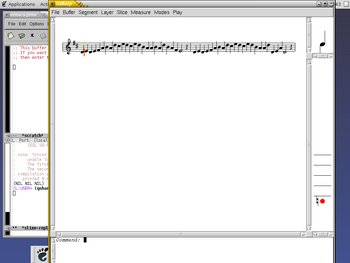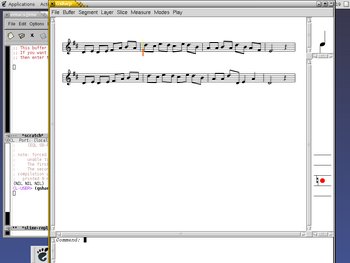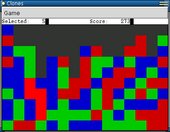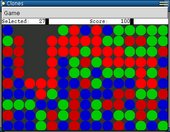February 25, 2004
Dynamic Lisp
Bill Clementson has two posts on the nuts & bolts of modifying lisp applications on the fly: Dynamically changing running Lisp code #1, Dynamically changing running Lisp code #2.
The Power of Automation
The difference between this
and this
is roughly C-x ( ] . C-f [ [ C-f C-x ) C-x e.
Successful Lisp Activity
Markus Fix has draft versions of the cover, table of contents and index of the upcoming paper version of David Lamkins' book Successful Lisp. Hopefully the book will come out sometime in the Spring of 2004.
February 23, 2004
CLHS Search Mozilla Plugin
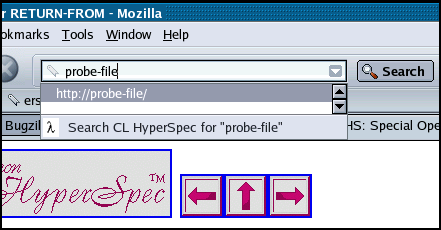
Xach Beane has a very simple lisp hyperspec search plugin for Mozilla. The plugin, originally by Andreas Fuchs, lets you search by symbol (probe-file), by section (9.1.2), and even by format directive (~A).
Once you've copied the plugin files to the correct location (instructions are on Xach's page), you can select “CL HyperSpec” as the default search engine in Mozilla's “Internet Search” preferences.
This would be handier if Mozilla had an easier interface to using multiple search engines. As it is, Google is too useful to relegate to secondary status.
February 20, 2004
A Startling Debut
<unnamed CMU grad> In CMU tradition it probably won't succeed but maybe crush a bunch of other entrants.
February 19, 2004
Return of the OpenMCL Wiki
Gary Byers has reinstated the OpenMCL wiki.
If anyone feels like messing around with it (adding content, just banging on the software to ensure that it's installed/configured correctly, getting a feel for how usable it is, etc.) that'd be helpful, and this might turn out to be A Useful And Good Thing.
February 18, 2004
New MCL Contribs
Glen Foy has uploaded some new code for MCL.
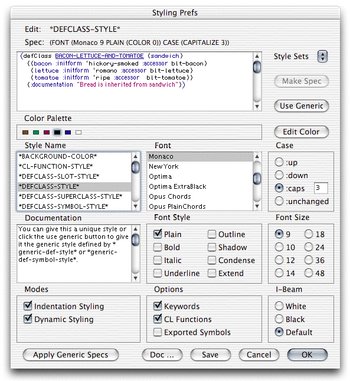
Color Coded 1.3 is an updated version of a source code styling utility (sort of the Fred equivalent of emacs fontification).
Auto IFT 0.1a1 “adds auto-spacing, auto-alignment and transparency drag-and-drop to the Interface Toolkit” (MCL's visual interface designer).
February 17, 2004
CLIM Spec
Gilbert Baumann's annotatable CLIM spec is back online, and has a new search/apropos feature.
February 16, 2004
Dusty Deathbots
As March 13 approaches, coverage of DARPA's Grand Challenge race increases. This Popular Science article makes me think that working under Red Whittaker is probably not easy.
The illustration above certainly cuts to the chase as far as the point of the Grand Challenge is concerned (well, actually, I wonder whether the military would really rather have autonomous supply trucks before robot tanks). I know one person who quit a Grand Challenge team because she decided she wasn't comfortable with the fact that it is, after all, a military project.
Apparently the ETCon attendees who heard Helen Greiner, co-founder and president of iRobot, experienced some discomfort too, once it became clear that development of the Roomba was funded almost entirely by iRobot's military projects. Roomba may be cute and servile, and bleep-bloop in the dust found under your coffee table instead of in the deserts of the middle east, but its ancestors are built for war.
February 11, 2004
OpenMCl 0.14.1
OpenMCL 0.14.1 has been released. Gary Byers says
OpenMCL 0.14.1 is one of a series of OpenMCL releases that uses native (POSIX) threads internally, incorporates a large subset of the MOP, and offers other features and architectural changes relative to earlier versions.
Unlike previous 0.14 releases, 0.14.1 calls itself a “beta”: this is certainly subjective, but I think that it's at least as stable and feature-complete as the 0.13 and earlier releases generally were.
One significant change is improved integration between CLOS and Objective C. “... ObjC classes and metaclasses are recognized as CLOS class objects: subclasses can be defined via DEFCLASS (with suitable arguments), instances can be created via MAKE-INSTANCE.”
CLORB 0.5
Lennart Staflin announced version 0.5 of his implementation of CORBA 2, CLORB.
CLORB works with MCL, OpenMCL, SBCL and CLISP.
February 10, 2004
Maintaining Portable Lisp Programs
Christophe Rhodes has a paper on how to use *features* effectively, “Maintaining Portable Lisp Programs”.
February 09, 2004
cl-pdf and cl-typesetting
Marc Battyani announced the release of cl-pdf 2.1 and cl-typesetting 2.1.
Now we just need cl-author and cl-illustrator.
February 08, 2004
Young Indy

Last night I saw the Raiders of the Lost Ark remake done by a bunch of insane kids over the course of 6 years.
Their obsession was, as Scott McCloud said, inspiring. The story behind this video would make the best director's commentary track ever. After a while you have to stop being amazed at the effort they put into it, it's just too exhausting.
Lori: “Prepubescent nazis!”. And teenage tribesmen. And the girl playing Marion totally nailed the drinking contest scene.
(I guess there's a big article on these guys in the new Vanity Fair; I haven't seen it yet.)
FannyPack
It's so six months ago, I'm sure, but squishy just infected me with FannyPack. They're totally fun.
fannypack / so stylistic
The origin of Fannypack, according to one of their co-producers in the MTV bio:
There was a guy selling belts for two dollars and he was snapping his belts making a beat and the girls were just standing there making up songs on the spot, singing along to this guy who was, uh, belt boxing. I was amazed so I hung out and listened for a while and they just kept coming up with these ridiculously simple and genius little dance hooks with only cheap, snapping leather as their musical accompaniment. I approached Jessibel and the rest is history.
Allmusic's version of the story is a little different.
February 06, 2004
Monterey Bay Aquarium
A couple weekends ago Lori and I went to Santa Cruz, and we spent most of a day at the Monterey Bay Aquarium. Here are some slides from that trip.
February 05, 2004
The Future Was Then: Grady Booch on Development Environments
Grady Booch at EclipseCon, as quoted by Bill Clementson:
For those of you looking at the future of development environments, I encourage you to go back and review some of the Xerox documentation for InterLisp-D.
Bill Clementson's weblog has been standing out from the crowd (“crowd”, heh) lately.
Apollo Artifacts Endangered
Paolo Amoroso sent me this:
As a fellow Lisper and space enthusiast, I hope you don't mind if I bring this issue to your attention. An artifact of huge importance for the history of space exploration, the Launch Umbilical Tower #1 (LUT-1 at Kennedy Space Center) used for Apollo 11, is going to be destroyed and disposed of in a few hours. A number of desperate efforts to save the LUT-1 are under way. They need immediate help, mostly corporate backing, money and publicitly. For more information see: http://www.apollosaturn.com/lut.htm http://www.savethelut.org/doug_LUT/ Anybody who can contribute money/sponsors is encouraged to contact asap: Ross Tierney ross.tierney@savethelut.org Jim McDade jim.mcdade@savethelut.org Thanks for your attention, Paolo
Bruce Sterling: “The era of manned spectaculars is visibly dying by inches.”
(Actually I was looking for the Sterling quote where he talks about either JSC or KSC as a “decaying spaceport”, but I had trouble finding it. Maybe I misremembered.)
OS X Options Now Include CMUCL
Pierre Mai has resurrected CMUCL's PPC backend and ported it to OS X. Binaries and sources are available.
Pierre goes on to say
In any case, AFAICT, PPC/OS X is now the platform with the most Common Lisp implementations, with at least OpenMCL, MCL, LispWorks, Allegro Common Lisp, CLISP, ECL, SBCL and now CMUCL supporting OS X/Darwin...
xmls 1.0
Miles Egan announced the 1.0 release of xmls, a small non-validating XML parser. “It's designed to be a self-contained, easily embedded parser that recognizes a useful subset of the XML spec. It provides a simple mapping from xml to lisp s-expressions and back.”
February 04, 2004
The Fragility of Power
Sorry for the downtime. I think I knocked the power strip switch to “Off” last night or this morning.
Lisp For Great Science
On cmucl-help, Nicolas Neuss mentioned a short paper of his, “On Using Common Lisp In Scientific Computing”
lisppaste
Brian Mastenbrook's IRC bot lisppaste has become quite useful on #lisp. Yesterday he announced version 2.1.1:
Lisppaste started out as a simple little hack using Araneida and the guts of weird-irc, but it has grown considerably: it has spawned a new library (cl-irc, based on weird-irc), added paste persistence, paste annotation, multiple channel support, and now RSS support and direct linking to the meme.b9.com IRC logs.
It's a fairly good example of a non-trivial web and network application in Common Lisp, so if you're interested in such things take a look at http://www.common-lisp.net/project/lisppaste. To see what the pastebot has acquired so far, check out http://www.common-lisp.net/paste/list, and to syndicate it in RSS try http://www.common-lisp.net/paste/list.rss.
February 03, 2004
Reading Code, Idiomatic Lisp
Brian Marick learned something new about how Richard Gabriel reads code. Patrick Logan has a schemey take.
I definitely read code in a Gabrielesque style as opposed to the Marick approach.
- Look for a key name.
- Quickly skip down to the code of maximum density. That's the important code. If that's not clear, find the declarations that clarify it by scanning upward. The most important ones will be nearby.
Using an &optional parameter as an internal, local variable? Jim Firby taught me to avoid that when I first learned lisp.
Real World Testing
Bryan O'Connor is going through the list of asdf installable packages and testing which ones work in OpenMCL. Kind of interesting.
February 01, 2004
Opeth
Thursday night Mark and I saw Opeth at the House of Blues in LA. Excellent show. More Swedish death metal, but they do this slow, beautiful sometimes acoustic stuff too. Often one song will go back and forth between slow, melodic singing and absolutely guttural roaring several times. I guess that makes them “progressive metal” (or “symphonic black metal”, heh).
The House of Blues on Sunset has great sound. And the crowd again surprised me with its friendliness; one guy next us fell to the floor, intoxicated, and half a dozen people standing near helped him up and asked after him.
The car got some attention, too.
opeth / weakness / deliverance
